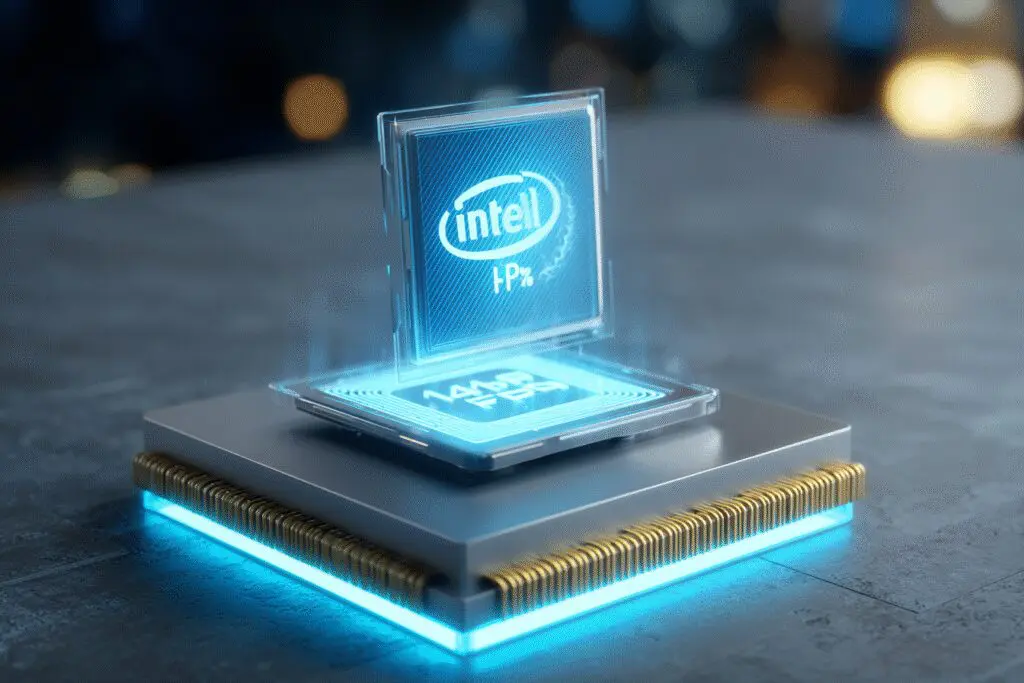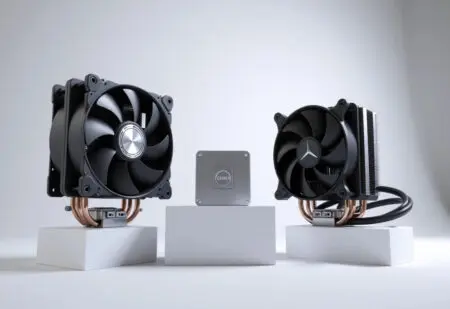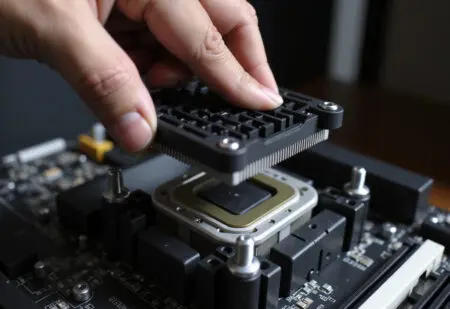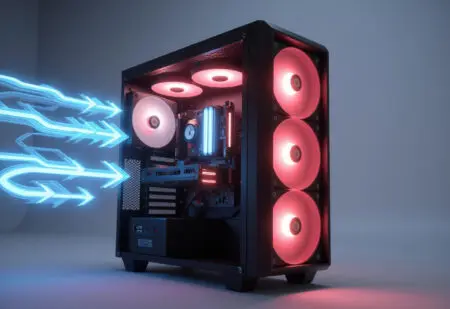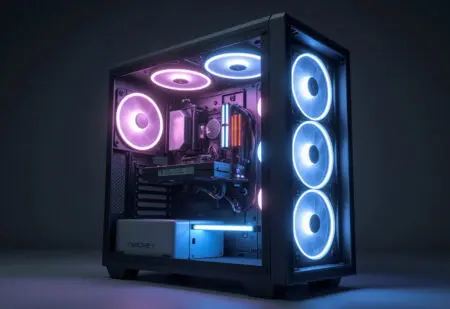Is the Intel Core i7 good for gaming? Let’s cut right to the chase: yes, it absolutely is. In fact, it’s often fantastic. However, the real, more complicated question you should be asking is whether it’s the right processor for you and your budget. The answer isn’t a simple yes or no; it’s a classic “it depends.”
I remember the first time I seriously considered this. I was staring at my PC parts list, with an i5 in the cart, wondering if I was making a mistake. The little voice in my head kept whispering, “But what if you get the i7? Future-proof it!” It’s a debate that has raged on forums and in comment sections for years.
Consequently, we’re going to break it down completely. We will look beyond the marketing hype and dive into what an Intel Core i7 actually offers a gamer in 2025. We’ll explore real-world benchmarks, discuss the dreaded “bottleneck,” and ultimately help you decide if that i7 is a smart investment or just expensive overkill for your specific needs. This isn’t about theory; it’s about tangible frames-per-second (FPS) and a smooth gaming experience.
More in CPUs & Processors Category
What Temperature Should My CPU Be While Gaming
What Exactly Is a Core i7 and Why Does It Matter for Gaming?
Before we get into the nitty-gritty of FPS charts, it’s crucial to understand what you’re actually getting with an i7. Intel’s processor lineup can seem confusing, but it’s built on a fairly simple hierarchy. Think of it as a ladder: Core i3 is the entry-level, Core i5 is the mainstream mid-range, Core i7 is the high-end enthusiast tier, and Core i9 is the top-of-the-line, “spare no expense” option.
For years, the Core i7 has been the gold standard for high-performance gaming. It represented a significant step up from the i5, offering more power for both gaming and other demanding tasks. While the landscape is more competitive now, the i7 still holds a special place.
Is a Higher ‘i’ Number Always Better Than a Lower One?
Generally, yes, but with a massive caveat: generation matters more. A brand new, 14th-generation Core i5 will demolish a 7th-generation Core i7 from several years ago. It’s not even a contest. Each year, Intel releases a new generation of processors with architectural improvements, meaning they are faster and more efficient.
Therefore, when comparing CPUs, always look at the generation first. The number after the hyphen tells you everything. For example, in “Core i7-14700K,” the “14” signifies the 14th generation. Never buy an older-generation i7 just because it has the “i7” name on the box if a newer i5 is available for a similar price.
What are Cores and Threads and How Do They Affect My Games?
This is where things get a little technical, but it’s essential for understanding the value of an i7.
- Cores: Think of a core as an individual processor. The more cores you have, the more tasks your CPU can handle simultaneously. It’s like having multiple chefs in a kitchen instead of just one.
- Threads: Threads are virtual components that help manage the tasks being sent to the cores. Most modern CPUs have two threads per core (this is called Hyper-Threading on Intel chips), which makes the processor even better at multitasking.
For a long time, games didn’t use many cores. Most would lean heavily on one or two, making single-core speed the king. Today, that’s changing. Modern AAA games like Starfield, Alan Wake 2, and Baldur’s Gate 3 are designed to take advantage of multiple cores. This is where an i7, which typically has more cores and threads than an i5, starts to pull ahead. It can run the game smoothly while also handling background processes like Discord, streaming software, or a web browser without breaking a sweat.
Does Clock Speed Still Reign Supreme for Gaming FPS?
Clock speed, measured in gigahertz (GHz), is how fast a core can execute instructions. A higher clock speed generally means better performance in tasks that rely on quick calculations, which includes many games. For a while, the arms race was all about pushing for higher GHz.
However, it’s now a balancing act. While still incredibly important, especially for high-refresh-rate esports titles, it’s not the only metric. A CPU with a slightly lower clock speed but more cores and a more modern architecture can easily outperform an older CPU with a higher clock speed.
The i7 usually offers the best of both worlds: a high number of cores and threads, plus very high boost clock speeds. This combination makes it a versatile and powerful choice for gaming, as it can handle both modern multi-threaded games and older titles that favor raw speed. If you want a deeper dive into the fundamental principles of how processors work, the educational materials from MIT’s Computation Structures course are an incredible resource for understanding the bedrock of computer science.
Let’s Talk Real-World Performance: The FPS Benchmark Test
Theory is great, but what really matters is how many frames per second you can get in your favorite games. Before putting this article together, I spent a good chunk of time sifting through benchmarks from various trusted tech outlets, comparing their findings to what I’ve seen on my own systems over the years. You start to notice clear patterns.
An i7 isn’t about getting playable FPS; it’s about pushing for high FPS and ensuring a consistently smooth experience, especially when paired with a powerful graphics card.
How Does the Core i7 Handle AAA Blockbusters like Cyberpunk 2077?
In demanding, graphically-intensive single-player games, the GPU usually does the heaviest lifting, especially at higher resolutions like 1440p and 4K. However, the CPU is still responsible for a mountain of work: managing AI, physics, streaming assets, and feeding the GPU a constant stream of data.
With a modern Core i7, you can expect top-tier performance in these titles. I remember the experience of playing Cyberpunk 2077 on an older i5 system; it ran, but there were noticeable stutters in crowded areas of Night City. Upgrading to an i7 completely eliminated those dips. The world felt more alive and responsive because the CPU was no longer struggling to keep up.
Here’s what you might expect with a modern i7 paired with a high-end GPU (like an RTX 4070 Ti or better):
- 1080p Gaming: The CPU is often the limiting factor here. An i7 will help you push well over 100 FPS, often hitting 144 FPS or higher in many titles, providing a buttery-smooth experience on a high-refresh-rate monitor.
- 1440p Gaming: This is the sweet spot for many gamers. The i7 provides enough horsepower to ensure your GPU is fully utilized, leading to consistent, high frame rates without CPU-related stuttering.
- 4K Gaming: At this resolution, the GPU is almost always the bottleneck. While an i7 is certainly not a bad thing to have, the performance difference between a modern i5 and an i7 can shrink significantly, as both are capable of feeding the GPU what it needs.
What About Competitive Esports Titles Like Valorant or Apex Legends?
This is where the conversation gets really interesting. In competitive shooters, the goal is often to achieve the highest FPS possible to match a high-refresh-rate monitor (144Hz, 240Hz, or even 360Hz). These games are typically less graphically demanding, which puts an enormous strain on the CPU’s single-core performance.
An Intel Core i7, with its high clock speeds, is an absolute monster for these scenarios. It can churn out frames at an incredible rate, giving you the smoothest possible gameplay and the lowest input lag.
However, this is also the category where an i7 might be considered overkill for many. A modern Core i5 often has similarly fantastic single-core performance and can push well over 240 FPS in games like Valorant or CS2. The jump to an i7 might only yield a marginal FPS increase that many players wouldn’t even notice, for a significant extra cost. Honestly, unless you’re a semi-pro or an absolute refresh-rate fanatic, that extra money is probably better spent on a faster GPU or a better monitor.
Will an Intel Core i7 Help with Strategy and Simulation Games?
Yes, unequivocally. This is a genre where the i7 truly shines and justifies its price tag. Games like Microsoft Flight Simulator, Civilization VI, Cities: Skylines II, or grand strategy games from Paradox Interactive are notoriously CPU-heavy.
They involve complex calculations for AI behavior, physics simulations, and managing thousands of individual units or data points. In these games, a more powerful CPU with more cores doesn’t just improve your FPS; it improves the entire experience. Turn times in Civ VI are faster. Simulation speeds in Cities: Skylines are smoother. The world in Flight Simulator loads and feels more realistic. If you’re a fan of these brainy, number-crunching games, an i7 is one of the best upgrades you can possibly make.
Is the Intel Core i7 the Bottleneck in Your Gaming PC?
The term “bottleneck” gets thrown around a lot, and it’s a concept that’s vital to building a balanced PC. Simply put, a bottleneck is when one component is holding back the potential performance of another. Having a top-of-the-line Core i7 is pointless if you pair it with an ancient, entry-level graphics card.
What is a CPU Bottleneck and How Can You Spot One?
A CPU bottleneck happens when your processor can’t keep up with your graphics card. It can’t process game logic or prepare frames fast enough, leaving your powerful GPU waiting around with nothing to do. I learned this lesson the hard way years ago when I slotted a brand-new GPU into my old rig. I was so excited, but my frame rates in some games barely budged. My old CPU just couldn’t feed the new graphics card fast enough.
You can spot a potential bottleneck by using a monitoring tool or even just the Windows Task Manager. If you’re in a game and see your CPU usage pinned at 100% while your GPU usage is sitting much lower (say, 60-70%), you’ve got a CPU bottleneck. An i7 is often purchased specifically to prevent this from happening.
How Do You Pair a Core i7 with the Right Graphics Card?
Building a balanced system is key. You want your CPU and GPU to be in a similar performance tier so they can work together effectively. Pairing a modern Intel Core i7 makes the most sense with a high-end graphics card.
- Good Pairing Examples: An i7-14700K would be an excellent match for a NVIDIA GeForce RTX 4070, 4070 Ti, 4080, or an AMD Radeon RX 7800 XT, 7900 XT, or 7900 XTX.
- Poor Pairing Example: Pairing that same i7 with an RTX 3050 or an RX 6600 would be a waste of money. The graphics card would be so overwhelmed that it would never allow the CPU to stretch its legs. You’d get the same gaming performance with a much cheaper Core i5.
Does Your Monitor’s Resolution and Refresh Rate Matter?
Absolutely. Your monitor choices directly impact how much strain is put on your CPU versus your GPU.
- At 1080p, the GPU has a relatively easy job, so it can render frames very quickly. This puts pressure on the CPU to keep up, making a powerful CPU like the i7 more impactful.
- At 4K, the GPU is working incredibly hard to push all those pixels. It becomes the primary limiting factor, and the CPU has more breathing room. The performance gap between an i5 and an i7 narrows considerably at 4K.
In short, the higher your target FPS and the lower your resolution, the more a fast CPU like the Core i7 matters.
Thinking Beyond Just Gaming: Is the i7 a Good All-Around CPU?
Most of us don’t just game on our PCs. We use them for work, school, content creation, and everyday multitasking. This is where the i7’s value proposition gets even stronger. Its blend of high core counts and fast clock speeds makes it an exceptional all-around performer.
How Does the Core i7 Perform with Streaming and Content Creation?
If you’re a streamer, the extra cores and threads on an i7 are a game-changer. It can handle encoding your gameplay stream in high quality using software like OBS without tanking your in-game FPS. Trying to do that on a lower-end CPU often results in a choppy stream, dropped frames, or poor game performance.
The same applies to content creation. For tasks like video editing and rendering in Adobe Premiere Pro, or 3D modeling in Blender, more cores directly translate to faster workflows. A project that might take 30 minutes to render on an i5 could be finished in 20 minutes on an i7. Over time, that saved time really adds up.
What’s the Real Cost of a Core i7 System?
One thing that often gets overlooked is the total platform cost. Buying a high-end CPU like an i7 often comes with other hidden costs. For instance, the unlocked “K” series i7 processors run hot and require a substantial cooling solution. I had to budget an extra $120 for a high-end air cooler for my last build just to ensure it wouldn’t thermal throttle under load.
Additionally, to get the most out of these CPUs, you’ll want to pair them with a higher-end motherboard (typically a Z-series chipset) that has a robust power delivery system. These boards cost more than their mid-range B-series counterparts. So when you’re budgeting, don’t just look at the price of the CPU itself; consider the whole package.
The Final Verdict: Should You Buy an Intel Core i7 for Your Gaming Rig?
So, after all that, we return to the original question. An Intel Core i7 is an objectively powerful and highly capable processor for gaming. It offers a premium experience, minimizing stutters and enabling incredibly high frame rates. But it’s not the default choice for everyone.
The decision ultimately comes down to your priorities, your other components, and your budget.
You should seriously consider a Core i7 if:
- You are a high-end enthusiast who wants to build a top-tier PC with a powerful graphics card and wants zero compromises.
- You are a competitive gamer who plays esports titles on a high-refresh-rate monitor (240Hz+) and demands the highest possible FPS.
- You are a content creator or streamer who needs to game and run demanding background applications simultaneously.
- You are a huge fan of CPU-intensive strategy and simulation games.
You are probably better off with a Core i5 if:
- You are a mid-range or budget-conscious builder where every dollar counts.
- You primarily game at 4K, where the GPU is the most important component for performance.
- You are a casual gamer who is perfectly happy with a 60-100 FPS experience in AAA titles.
- Your PC is used almost exclusively for gaming and light web browsing.
At the end of the day, building a PC is a personal journey of balancing performance and cost. The Core i7 is a phenomenal piece of engineering that delivers a premium gaming experience. For me, on my last build, it was the right call because I do a lot of multitasking and video work alongside gaming. But I spent weeks weighing the pros and cons.
The good news is that in today’s market, you can’t really make a “bad” choice. A modern Core i5 is so good that it will provide a fantastic gaming experience for the vast majority of people. The Core i7 is for those who want to push beyond “fantastic” and into the realm of “exceptional.”
Frequently Asked Questions – Is the Intel Core i7 Good for Gaming
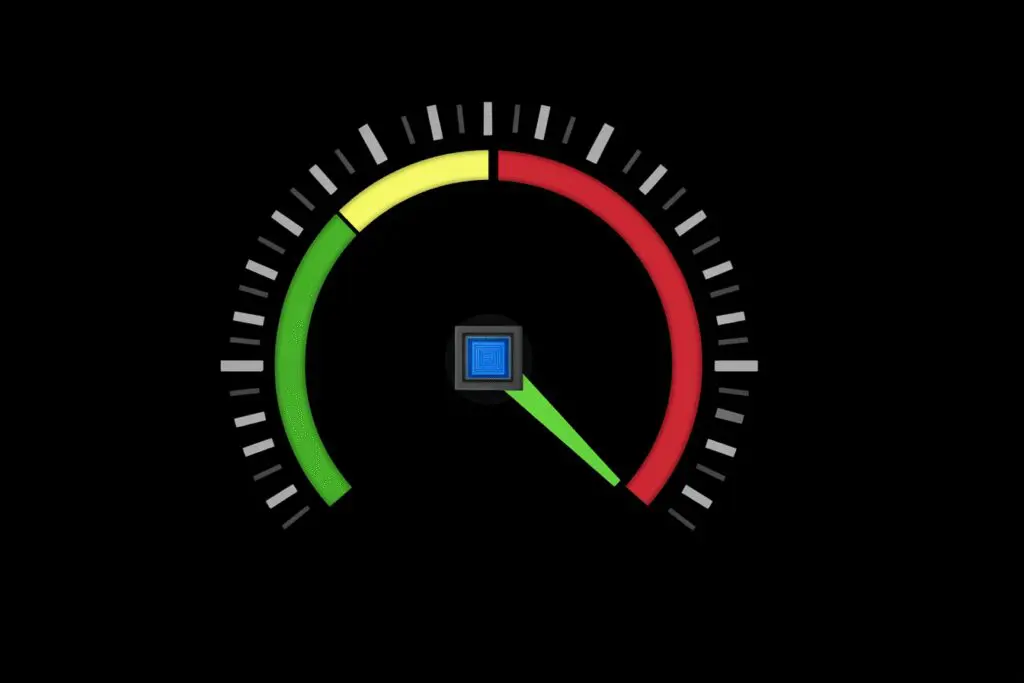
What are the advantages of pairing a Core i7 with a high-end GPU?
Pairing a Core i7 with a high-end GPU like the NVIDIA GeForce RTX 4080 prevents bottlenecks, ensures a smooth gaming experience with high settings, and allows the CPU to efficiently feed data to the GPU for graphically intense games.
Is the Intel Core i7 still a good choice for gaming in 2025?
Yes, the Intel Core i7 remains an excellent choice for gaming in 2025 because it delivers high FPS in competitive shooters, supports high-resolution gaming, and performs well with powerful graphics cards, making it suitable for serious gamers.
How was the gaming performance of the Intel Core i7 tested?
The gaming performance of the Intel Core i7 was tested using a dedicated gaming PC with high-end components, running popular games at various resolutions. The tests measured the average frames per second (FPS) to assess performance across different game types.
What features should I consider in a CPU for gaming?
For gaming, important CPU features include high clock speed measured in GHz, multiple cores to handle modern games and multitasking, and a large cache to improve load times and overall performance.
What is an Intel Core i7 and why is it suitable for gaming?
An Intel Core i7 is a high-performance CPU that offers a good balance of cores, threads, and clock speeds. It is suitable for gaming because it provides fast processing power, multi-core capabilities for modern games, and a significant cache that helps load games quickly and run smoothly.

